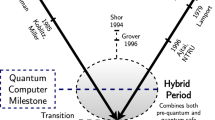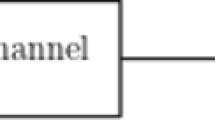Abstract
We consider a communication network with random network coding which can be attacked by adversaries of two types. One of them can wiretap original packets outgoing from source to destination. The other can insert its own packets into information flow, which are wrong messages for the receiver. To provide secure communication, we use a scheme based on combining the GPT (Gabidulin-Paramonov-Tretjakov) public key cryptosystem and SKK (Silva-Kschischang-Koetter) codes. Encrypted packets are transmitted to the destination through wired channels. Performance of this system is investigated. The main result is that the proposed scheme is secure against wiretapping and insertion attacks under some conditions which depend on rank code parameters.
Similar content being viewed by others
References
Ahlswede, R., Cai, N., Li, S.R., and Yeung, R.W., Network Information Flow, IEEE Trans. Inform. Theory, 2000, vol. 47, no. 7, pp. 1204–1216.
Ho, T., Koetter, R., Médard, M., Karger, D.R., and Effros, M., The Benefits of Coding over Routing in a Randomized Setting, in Proc. 2003 Int. Sympos. on Information Theory (ISIT’2003), Yokohama, Japan, 2003, p. 442.
Chou, P.A., Wu, Y., and Jain, K., Practical Network Coding, in Proc. 41st Allerton Conf. on Communications, Control, and Computing, Monticello, IL, USA, 2003, pp. 40–49.
Ho, T., Médard, M., Koetter, R., Karger, D.R., Effros, M., Shi, J., and Leong, B., A Random Linear Network Coding Approach to Multicast, IEEE Trans. Inform. Theory, 2006, vol. 52, no. 10, pp. 4413–4430.
Koetter, R. and Kschischang, F.R., Coding for Errors and Erasures in Random Network Coding, in Proc. 2007 IEEE Int. Sympos. on Information Theory (ISIT’2007), Nice, France, 2007, pp. 791–795.
Silva, D., Kschischang, F.R., and Koetter, R., A Rank-Metric Approach to Error Control in Random Network Coding, IEEE Trans. Inform. Theory, 2008, vol. 54, no. 9, pp. 3951–3967.
Gabidulin, E.M., Paramonov, A.V., and Tretjakov, O.V., Ideals over a Non-commutative Ring and Their Application in Cryptology, Advances in Cryptology (Proc. EUROCRYPT’91: Workshop on the Theory and Application of Cryptographic Techniques, Brighton, UK, 1991), Davies, D.W., Ed., Lect. Notes Comp. Sci, vol. 547. Berlin: Springer, 1991, pp. 482–489.
Kshevetskiy, A., Security of GPT-like Public-Key Cryptosystem Based on Linear Rank Codes, in Proc. 3rd Int. Workshop on Signal Design and Its Applications in Communications (IWSDA’07), Chengdu, China, 2007, pp. 143–147.
Gabidulin, E.M., Rashwan, H., and Honary, B., On Improving Security of GPT Cryptosystems, in Proc. 2009 IEEE Int. Sympos. on Information Theory (ISIT’2009), Seoul, Korea, 2009, pp. 1110–1114.
Rashwan, H., Gabidulin, E.M., and Honary, B., A Smart Approach for GPT Cryptosystem Based on Rank Codes, in Proc. 2010 IEEE Int. Sympos. on Information Theory (ISIT’2010), Austin, Texas, USA, 2010, pp. 2463–2467.
Rashwan, H., Gabidulin, E.M., and Honary, B., Security of the GPT Cryptosystems and Its Applications to Cryptography, Secur. Commun. Netw., 2011, vol. 4, no. 8, pp. 937–946.
Cai, N. and Yeung, R.W., Secure Network Coding, in Proc. 2002 IEEE Int. Sympos. on Information Theory (ISIT’2002), Lausanne, Switzerland, 2002, p. 323.
Ho, T., Leong, B., Koetter, R., Médard, M., Effros, M., and Karger, D., Byzantine Modification Detection in Multicast Networks with Random Network Coding, IEEE Trans. Inform. Theory, 2008, vol. 54, no. 6, pp. 2798–2803.
Jaggi, S., Langberg, M., Katti, S., Ho, T., Katabi, D., Médard, M., and Effros, M., Resilient Network Coding in the Presence of Byzantine Adversaries, IEEE Trans. Inform. Theory, 2008, vol. 54, no. 6, pp. 2596–2603.
Gabidulin, E.M., Theory of Codes with Maximum Rank Distance, Probl. Peredachi Inf., 1985, vol. 21, no. 1, pp. 3–16 [Probl. Inf. Trans. (Engl. Transl.), 1985, vol. 21, no. 1, pp. 1–12].
Gabidulin, E.M., A FastMatrix Decoding Algorithm for Rank-Error-CorrectingCodes, Proc. 1st French-Soviet Workshop on Algebraic Coding, Paris, France, 1991, Cohen, G., Litsyn, S., Lobstein, A., and Zémor, G., Eds., Lect. Notes Comp. Sci., vol. 573, Berlin: Springer, 1992, pp. 126–133.
Gabidulin, E.M. and Pilipchuk, N.I., Error and Erasure Correcting Algorithms for Rank Codes, Des. Codes Cryptogr., 2008, vol. 49, no. 1–3, pp. 105–122.
Silva, D. and Kschischang, F.R., Fast Encoding and Decoding of Gabidulin Codes, in Proc. 2009 Int. Sympos. on Information Theory (ISIT’2009), Seoul, Korea, 2009, pp. 2858–2862.
Gabidulin, E.M., Pilipchuk, N.I., and Bossert, M., Decoding of Random Network Codes, Probl. Peredachi Inf., 2010, vol. 46, no. 4, pp. 33–55 [Probl. Inf. Trans. (Engl. Transl.), 2010, vol. 46, no. 4, pp. 300–320].
Silva, D. and Kschischang, F., Universal Secure Error-Correcting Schemes for Network Coding, in Proc. 2010 IEEE Int. Sympos. on Information Theory (ISIT’2010), Austin, Texas, USA, 2010, pp. 2428–2432.
Tao, F., Bingtao, Z., and Jiangfeng, M., Security Random Network Coding Model Against Byzantine Attack Based on CBC, in Proc. 4th Int. Conf. on Intelligent Computation Technology and Automation (ICICTA’2011), Shenzhen, Guangdong, China, 2011, vol. 2, pp. 1178–1181.
Gabidulin, E.M., Paramonov, A.V., and Tretjakov, O.V., Rank Errors and Rank Erasures Correction, in Proc. 4th Int. Colloq. on Coding Theory, Dilijan, Armenia, 1991, Yerevan, 1992, pp. 11–19.
Ourivski, A.V. and Johansson, T., New Technique for Decoding Codes in the Rank Metric and Its Cryptography Applications, Probl. Peredachi Inf., 2002, vol. 38, no. 3, pp. 83–93 [Probl. Inf. Trans. (Engl. Transl.), 2002, vol. 38, no. 3, pp. 237–246].
Gaborit, P., Ruatta, O., and Schrek, J., On the Complexity of the Rank Syndrome Decoding Problem, arXiv:1301.1026v1 [cs.CR], 2013.
Author information
Authors and Affiliations
Corresponding author
Additional information
Original Russian Text © E.M. Gabidulin, N.I. Pilipchuk, B. Honary, H. Rashwan, 2013, published in Problemy Peredachi Informatsii, 2013, Vol. 49, No. 2, pp. 92–106.
Supported in part by the Russian Foundation for Basic Research, project no. 12-07-00122-a.
Rights and permissions
About this article
Cite this article
Gabidulin, E.M., Pilipchuk, N.I., Honary, B. et al. Information security in a random network coding network. Probl Inf Transm 49, 179–191 (2013). https://doi.org/10.1134/S0032946013020075
Received:
Accepted:
Published:
Issue Date:
DOI: https://doi.org/10.1134/S0032946013020075




